The Yii framework is a fast, efficient, and secure PHP development framework. Relying on a rich set of tools and components, the Yii framework can help developers build high-quality Web applications more easily. Among them, ORM (Object Relational Mapping) is one of the features of Yii framework. This article will briefly introduce the ORM in the Yii framework and explain how it simplifies database operations.
1. What is ORM
ORM refers to object-relational mapping, which maps objects in object-oriented programming languages to tables in relational databases, allowing developers to directly use object-oriented way to manipulate data in the database without writing complex SQL statements. ORM frameworks are used in many programming languages and development frameworks, such as Java's Hibernate and .NET's Entity Framework.
2. ORM in Yii framework
Yii framework has a built-in simple and easy-to-use ORM framework-ActiveRecord. ActiveRecord is a schema design pattern that maps a domain model class to a relational database table one-to-one. ActiveRecord in Yii inherits from PHP's PDO (PHP Data Object) and provides many functions, such as accessing data, saving data, validating data, querying data, etc.
3. How to use ORM
- Define model class
In the Yii framework, creating a model class is the first step in using ORM. The model class represents a data table or a group of data tables, and the ORM binds the model class and the data table together. Creating a model class is very simple. You only need to create a class that inherits from ActiveRecord in the Yii framework and name it the same as the data table. - Query data
Using ORM you can easily query data in the database. The Yii framework provides various methods to query data, such as find(), findAll(), findBySql(), count(), etc. Using these methods, you can easily obtain data from the database without writing handwritten query statements. - Add data
In the Yii framework, adding data is also very simple. Just set the properties on an instance of the model class and call the save() method to save it. The ORM will generate the correct SQL statements and save the data to the database. - Update data
Updating data is similar to adding data. You only need to find the data record to be updated, modify it to a new value, and then call the save() method.
5. Deleting data
Deleting data in Yii uses the delete() method of the model class instead of the handwritten DELETE statement. Just specify the records you want to delete, and the ORM will generate the corresponding SQL statement and delete the data from the database.
4. Advantages of ORM
ORM has many advantages, the biggest of which is simplifying database operations. ORM allows developers to directly manipulate data in an object-oriented manner without writing complex SQL statements. ORM can also help developers avoid security issues such as SQL injection. In addition, ORM can improve code reusability, reduce development time and cost, and follow standard design patterns.
5. Conclusion
ORM is an important part of the Yii framework. It provides a fast, efficient and secure method to access relational databases. By using the ORM in the Yii framework, developers can easily complete data operations without writing complex SQL statements. While an ORM is not a silver bullet to solve all problems, it is a reliable way to simplify database operations.
The above is the detailed content of ORM in Yii framework: Simplifying database operations. For more information, please follow other related articles on the PHP Chinese website!
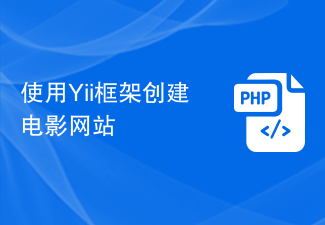 使用Yii框架创建电影网站Jun 21, 2023 am 09:04 AM
使用Yii框架创建电影网站Jun 21, 2023 am 09:04 AM随着互联网的普及以及人们对电影的热爱,电影网站成为了一个受欢迎的网站类型。在创建一个电影网站时,一个好的框架是非常必要的。Yii框架是一个高性能的PHP框架,易于使用且具有出色的性能。在本文中,我们将探讨如何使用Yii框架创建一个电影网站。安装Yii框架在使用Yii框架之前,需要先安装框架。安装Yii框架非常简单,只需要在终端执行以下命令:composer
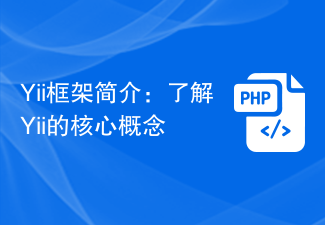 Yii框架简介:了解Yii的核心概念Jun 21, 2023 am 09:39 AM
Yii框架简介:了解Yii的核心概念Jun 21, 2023 am 09:39 AMYii框架是一个高性能、高扩展性、高可维护性的PHP开发框架,在开发Web应用程序时具有很高的效率和可靠性。Yii框架的主要优点在于其独特的特性和开发方法,同时还集成了许多实用的工具和功能。Yii框架的核心概念MVC模式Yii采用了MVC(Model-View-Controller)模式,是一种将应用程序分为三个独立部分的模式,即业务逻辑处理模型、用户界面呈
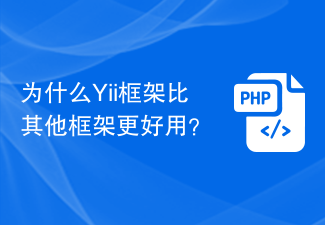 为什么Yii框架比其他框架更好用?Jun 21, 2023 am 10:30 AM
为什么Yii框架比其他框架更好用?Jun 21, 2023 am 10:30 AMYii框架是一个高性能、可扩展、安全的PHP框架。它是一个优秀的开发工具,能够让开发者快速高效地构建复杂的Web应用程序。以下是几个原因,让Yii框架比其他框架更好用。高性能Yii框架使用了一些先进的技术,例如,延迟加载(lazyloading)和自动加载机制(automaticclassloading),这使得Yii框架的性能高于许多其他框架。它还提
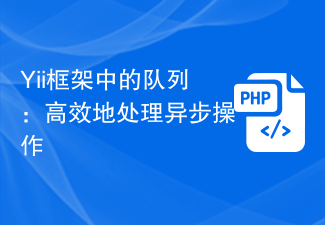 Yii框架中的队列:高效地处理异步操作Jun 21, 2023 am 10:13 AM
Yii框架中的队列:高效地处理异步操作Jun 21, 2023 am 10:13 AM随着互联网的快速发展,应用程序对于处理大量并发请求和任务变得越来越重要。在这样的情况下,处理异步任务是必不可少的,因为这可以使应用程序更加高效,并更好地响应用户请求。Yii框架提供了一个方便的队列组件,使得处理异步操作更加容易和高效。在本篇文章中,我们将探讨Yii框架中队列的使用和优势。什么是队列队列是一种数据结构,用于处理数据的先进先出(FIFO)顺序。队
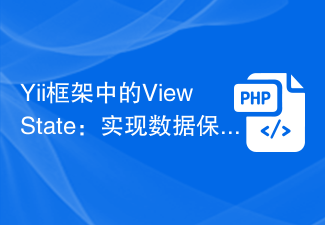 Yii框架中的ViewState:实现数据保护Jun 21, 2023 am 09:02 AM
Yii框架中的ViewState:实现数据保护Jun 21, 2023 am 09:02 AMViewState是ASP.NET中的一种机制,用于保护页面的隐私数据。而在Yii框架中,ViewState同样也是实现页面数据保护的重要手段。在Web开发中,随着用户界面操作的复杂度增加,前端与后端之间的数据传输也愈发频繁。但是,不可避免的会有恶意用户通过网络抓包等手段截获数据。而未加保护的数据可能含有用户隐私、订单信息、财务数据等重要资料。因此,加密传输
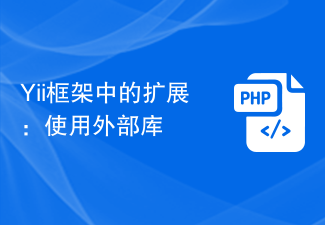 Yii框架中的扩展:使用外部库Jun 21, 2023 am 10:11 AM
Yii框架中的扩展:使用外部库Jun 21, 2023 am 10:11 AMYii是一款优秀的PHP框架,它提供了很多丰富的功能和组件来加快Web应用程序的开发。其中一个非常重要的特性就是可以方便地使用外部库进行扩展。Yii框架中的扩展可以帮助我们快速完成许多常见的任务,例如操作数据库、缓存数据、发送邮件、验证表单等等。但是有时候,我们需要使用一些其他的PHP类库来完成特定的任务,例如调用第三方API、处理图片、生成PDF文件等等。
 Yii框架中的分页机制:优化数据展示效果Jun 21, 2023 am 08:43 AM
Yii框架中的分页机制:优化数据展示效果Jun 21, 2023 am 08:43 AM在现今互联网时代,数据的处理和展示对于各种应用而言都是至关重要的。对于一些数据量较大的网站,其展示效果直接影响用户体验,而优秀的分页机制可以使得数据展示更加清晰,提高用户的使用体验。在本文中,我们将介绍Yii框架中的分页机制,并探讨如何通过优化分页机制来改进数据展示效果。Yii框架是一种基于PHP语言的高性能、适用于Web应用的开发框架。它提供
 Yii框架中的ORM:简化数据库操作Jun 21, 2023 am 08:19 AM
Yii框架中的ORM:简化数据库操作Jun 21, 2023 am 08:19 AMYii框架是一款快速、高效、安全的PHP开发框架,依托于丰富的工具和组件,Yii框架可以帮助开发者更轻松地构建高质量的Web应用程序。其中,ORM(对象关系映射)是Yii框架其中之一的特点。这篇文章将简单介绍Yii框架中的ORM,并说明其如何简化数据库操作。一、什么是ORMORM是指对象关系映射,它将面向对象的编程语言中的对象与关系型数据库中的表进行映射,使


Hot AI Tools

Undresser.AI Undress
AI-powered app for creating realistic nude photos

AI Clothes Remover
Online AI tool for removing clothes from photos.

Undress AI Tool
Undress images for free

Clothoff.io
AI clothes remover

AI Hentai Generator
Generate AI Hentai for free.

Hot Article

Hot Tools

SublimeText3 Linux new version
SublimeText3 Linux latest version

WebStorm Mac version
Useful JavaScript development tools

Dreamweaver CS6
Visual web development tools

SAP NetWeaver Server Adapter for Eclipse
Integrate Eclipse with SAP NetWeaver application server.

SublimeText3 Chinese version
Chinese version, very easy to use






